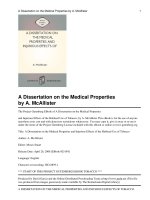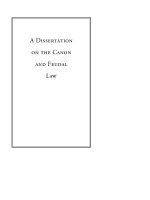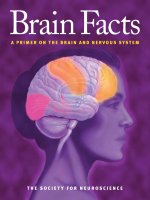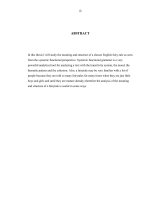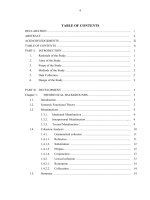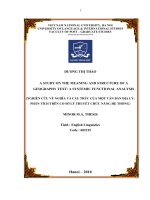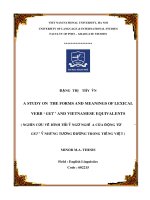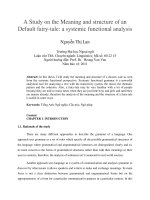A Dissertation on the Canon and Feudal Law ppt
Bạn đang xem bản rút gọn của tài liệu. Xem và tải ngay bản đầy đủ của tài liệu tại đây (74.8 KB, 18 trang )
A Dissertation
on the Canon
and Feudal
Law
20
Early in 1765 John Adams began writing an essay on the history of
ecclesiastical and civil despotism for the Sodality, a private club of Boston
lawyers. His purpose was to contrast the tyranny of the canon and feudal
law against New England’s heroic struggle for freedom. He soon decided to
expand and publish his “Dissertation on the Canon and Feudal Law” when
he learned of Parliament’s approval of the Stamp Act in March 1765. In his
diary, Adams described the Stamp Act as an “enormous Engine, fabricated
by the british Parliament, for battering down all the Rights and Liberties of
America.”
The “Dissertation” is an essay in political education. Its larger purpose
was to raise an alarm against an impending threat and to rouse the people
in defense of their rights. Adams saw in the Stamp Act an early-warning
signal indicating the direction of British colonial policy. It violated in two
important ways the most fundamental principle of the English constitution:
the principle of consent. The Stamp Act denied the rights guaranteed by
Magna Carta that no citizen shall be deprived of his property or taxed without
his consent, and it extended juryless courts of admiralty into the American
colonies. When combined with the recently passed Sugar Act, the Stamp Act
permitted the transfer of revenue enforcement from regular common-law
courts to the newly empowered admiralty courts. In Adams’s eyes, this meant
that unconstitutional courts would now enforce unconstitutional taxes. He
concludes rather ominously by suggesting that there was “a direct and formal
design on foot, to enslave all America.”
21
2
A Dissertation on
the Canon and
Feudal Law
“Ignorance and inconsideration are the two great causes of the ruin
of mankind.” This is an observation of Dr. Tillotson, with relation to the
interest of his fellow men in a future and immortal state. But it is of equal
truth and importance if applied to the happiness of men in society, on this
side the grave. In the earliest ages of the world, absolute monarchy seems to
have been the universal form of government. Kings, and a few of their great
counsellors and captains, exercised a cruel tyranny over the people, who held
a rank in the scale of intelligence, in those days, but little higher than the
camels and elephants that carried them and their engines to war.
By what causes it was brought to pass, that the people in the middle ages
became more intelligent in general, would not, perhaps, be possible in these
days to discover. But the fact is certain; and wherever a general knowledge
and sensibility have prevailed among the people, arbitrary government and
every kind of oppression have lessened and disappeared in proportion. Man
has certainly an exalted soul; and the same principle in human nature,—that
aspiring, noble principle founded in benevolence, and cherished by knowl-
edge; I mean the love of power, which has been so often the cause of slav-
ery,—has, whenever freedom has existed, been the cause of freedom. If it is
this principle that has always prompted the princes and nobles of the earth,
by every species of fraud and violence to shake off all the limitations of their
power, it is the same that has always stimulated the common people to aspire
at independency, and to endeavor at confining the power of the great within
the limits of equity and reason.
The poor people, it is true, have been much less successful than the great.
They have seldom found either leisure or opportunity to form a union and
exert their strength; ignorant as they were of arts and letters, they have seldom
been able to frame and support a regular opposition. This, however, has been
A Dissertation on the Canon and Feudal Law
22
known by the great to be the temper of mankind; and they have accordingly
labored, in all ages, to wrest from the populace, as they are contemptuously
called, the knowledge of their rights and wrongs, and the power to assert the
former or redress the latter. I say rights, for such they have, undoubtedly,
antecedent to all earthly government,—Rights, that cannot be repealed or
restrained by human laws—Rights, derived from the great Legislator of the
universe.
Since the promulgation of Christianity, the two greatest systems of tyr-
anny that have sprung from this original, are the canon and the feudal law.
The desire of dominion, that great principle by which we have attempted to
account for so much good and so much evil, is, when properly restrained, a
very useful and noble movement in the human mind. But when such re-
straints are taken off, it becomes an encroaching, grasping, restless, and un-
governable power. Numberless have been the systems of iniquity contrived
by the great for the gratification of this passion in themselves; but in none
of them were they ever more successful than in the invention and establish-
ment of the canon and the feudal law.
By the former of these, the most refined, sublime, extensive, and aston-
ishing constitution of policy that ever was conceived by the mind of man
was framed by the Romish clergy for the aggrandisement of their own order.
All the epithets I have here given to the Romish policy are just, and will be
allowed to be so when it is considered, that they even persuaded mankind
to believe, faithfully and undoubtingly, that God Almighty had entrusted
them with the keys of heaven, whose gates they might open and close at
pleasure; with a power of dispensation over all the rules and obligations of
morality; with authority to license all sorts of sins and crimes; with a power
of deposing princes and absolving subjects from allegiance; with a power of
procuring or withholding the rain of heaven and the beams of the sun; with
the management of earthquakes, pestilence, and famine; nay, with the mys-
terious, awful, incomprehensible power of creating out of bread and wine
the flesh and blood of God himself. All these opinions they were enabled to
spread and rivet among the people by reducing their minds to a state of
sordid ignorance and staring timidity, and by infusing into them a religious
horror of letters and knowledge. Thus was human nature chained fast for
ages in a cruel, shameful, and deplorable servitude to him, and his subordi-
nate tyrants, who, it was foretold, would exalt himself above all that was
called God, and that was worshipped.
In the latter we find another system, similar in many respects to the
former; which, although it was originally formed, perhaps, for the necessary
defence of a barbarous people against the inroads and invasions of her neigh-
A Dissertation on the Canon and Feudal Law
23
boring nations, yet for the same purposes of tyranny, cruelty, and lust, which
had dictated the canon law, it was soon adopted by almost all the princes of
Europe, and wrought into the constitutions of their government. It was orig-
inally a code of laws for a vast army in a perpetual encampment. The general
was invested with the sovereign propriety of all the lands within the territory.
Of him, as his servants and vassals, the first rank of his great officers held
the lands; and in the same manner the other subordinate officers held of
them; and all ranks and degrees held their lands by a variety of duties and
services, all tending to bind the chains the faster on every order of mankind.
In this manner the common people were held together in herds and clans in
a state of servile dependence on their lords, bound, even by the tenure of
their lands, to follow them, whenever they commanded, to their wars, and
in a state of total ignorance of every thing divine and human, excepting the
use of arms and the culture of their lands.
But another event still more calamitous to human liberty, was a wicked
confederacy between the two systems of tyranny above described. It seems
to have been even stipulated between them, that the temporal grandees
should contribute every thing in their power to maintain the ascendency of
the priesthood, and that the spiritual grandees in their turn, should employ
their ascendency over the consciences of the people, in impressing on their
minds a blind, implicit obedience to civil magistracy.
Thus, as long as this confederacy lasted, and the people were held in
ignorance, liberty, and with her, knowledge and virtue too, seem to have
deserted the earth, and one age of darkness succeeded another, till God in
his benign providence raised up the champions who began and conducted
the Reformation. From the time of the Reformation to the first settlement
of America, knowledge gradually spread in Europe, but especially in England;
and in proportion as that increased and spread among the people, ecclesias-
tical and civil tyranny, which I use as synonymous expressions for the canon
and feudal laws, seem to have lost their strength and weight. The people
grew more and more sensible of the wrong that was done them by these
systems, more and more impatient under it, and determined at all hazards
to rid themselves of it; till at last, under the execrable race of the Stuarts, the
struggle between the people and the confederacy aforesaid of temporal and
spiritual tyranny, became formidable, violent, and bloody.
It was this great struggle that peopled America. It was not religion alone,
as is commonly supposed; but it was a love of universal liberty, and a hatred,
a dread, a horror, of the infernal confederacy before described, that projected,
conducted, and accomplished the settlement of America.
It was a resolution formed by a sensible people,—I mean the Puritans,—
A Dissertation on the Canon and Feudal Law
24
almost in despair. They had become intelligent in general, and many of them
learned. For this fact, I have the testimony of Archbishop King himself, who
observed of that people, that they were more intelligent and better read than
even the members of the church, whom he censures warmly for that reason.
This people had been so vexed and tortured by the powers of those days, for
no other crime than their knowledge and their freedom of inquiry and ex-
amination, and they had so much reason to despair of deliverance from those
miseries on that side the ocean, that they at last resolved to fly to the wil-
derness for refuge from the temporal and spiritual principalities and powers,
and plagues and scourges of their native country.
After their arrival here, they began their settlement, and formed their
plan, both of ecclesiastical and civil government, in direct opposition to the
canon and the feudal systems. The leading men among them, both of the
clergy and the laity, were men of sense and learning. To many of them
the historians, orators, poets, and philosophers of Greece and Rome were
quite familiar; and some of them have left libraries that are still in being,
consisting chiefly of volumes in which the wisdom of the most enlightened
ages and nations is deposited,—written, however, in languages which their
great-grandsons, though educated in European universities, can scarcely read.
Thus accomplished were many of the first planters in these colonies. It
may be thought polite and fashionable by many modern fine gentlemen,
perhaps, to deride the characters of these persons, as enthusiastical, supersti-
tious, and republican. But such ridicule is founded in nothing but foppery
and affectation, and is grossly injurious and false. Religious to some degree
of enthusiasm it may be admitted they were; but this can be no peculiar
derogation from their character; because it was at that time almost the uni-
versal character not only of England, but of Christendom. Had this, however,
been otherwise, their enthusiasm, considering the principles on which it was
founded and the ends to which it was directed, far from being a reproach to
them, was greatly to their honor; for I believe it will be found universally
true, that no great enterprise for the honor or happiness of mankind was ever
achieved without a large mixture of that noble infirmity. Whatever imper-
fections may be justly ascribed to them, which, however, are as few as any
mortals have discovered, their judgment in framing their policy was founded
in wise, humane, and benevolent principles. It was founded in revelation and
in reason too. It was consistent with the principles of the best and greatest
and wisest legislators of antiquity. Tyranny in every form, shape, and ap-
pearance was their disdain and abhorrence; no fear of punishment, nor even
of death itself in exquisite tortures, had been sufficient to conquer that steady,
manly, pertinacious spirit with which they had opposed the tyrants of those
A Dissertation on the Canon and Feudal Law
25
days in church and state. They were very far from being enemies to mon-
archy; and they knew as well as any men, the just regard and honor that is
due to the character of a dispenser of the mysteries of the gospel of grace.
But they saw clearly, that popular powers must be placed as a guard, a control,
a balance, to the powers of the monarch and the priest, in every government,
or else it would soon become the man of sin, the whore of Babylon, the
mystery of iniquity, a great and detestable system of fraud, violence, and
usurpation. Their greatest concern seems to have been to establish a govern-
ment of the church more consistent with the Scriptures, and a government
of the state more agreeable to the dignity of human nature, than any they
had seen in Europe, and to transmit such a government down to their pos-
terity, with the means of securing and preserving it forever. To render the
popular power in their new government as great and wise as their principles
of theory, that is, as human nature and the Christian religion require it should
be, they endeavored to remove from it as many of the feudal inequalities and
dependencies as could be spared, consistently with the preservation of a mild
limited monarchy. And in this they discovered the depth of their wisdom
and the warmth of their friendship to human nature. But the first place is
due to religion. They saw clearly, that of all the nonsense and delusion which
had ever passed through the mind of man, none had ever been more extrav-
agant than the notions of absolutions, indelible characters, uninterrupted
successions, and the rest of those fantastical ideas, derived from the canon
law, which had thrown such a glare of mystery, sanctity, reverence, and right
reverend eminence and holiness, around the idea of a priest, as no mortal
could deserve, and as always must, from the constitution of human nature,
be dangerous in society. For this reason, they demolished the whole system
of diocesan episcopacy; and, deriding, as all reasonable and impartial men
must do, the ridiculous fancies of sanctified effluvia from episcopal fingers,
they established sacerdotal ordination on the foundation of the Bible and
common sense. This conduct at once imposed an obligation on the whole
body of the clergy to industry, virtue, piety, and learning, and rendered that
whole body infinitely more independent on the civil powers, in all respects,
than they could be where they were formed into a scale of subordination,
from a pope down to priests and friars and confessors,—necessarily and
essentially a sordid, stupid, and wretched herd,—or than they could be in
any other country, where an archbishop held the place of a universal bishop,
and the vicars and curates that of the ignorant, dependent, miserable rabble
aforesaid,—and infinitely more sensible and learned than they could be in
either. This subject has been seen in the same light by many illustrious pa-
triots, who have lived in America since the days of our forefathers, and who
A Dissertation on the Canon and Feudal Law
26
have adored their memory for the same reason. And methinks there has not
appeared in New England a stronger veneration for their memory, a more
penetrating insight into the grounds and principles and spirit of their policy,
nor a more earnest desire of perpetuating the blessings of it to posterity, than
that fine institution of the late Chief Justice Dudley, of a lecture against
popery, and on the validity of presbyterian ordination. This was certainly
intended by that wise and excellent man, as an eternal memento of the
wisdom and goodness of the very principles that settled America. But I must
again return to the feudal law. The adventurers so often mentioned, had an
utter contempt of all that dark ribaldry of hereditary, indefeasible right,—
the Lord’s anointed,—and the divine, miraculous original of government,
with which the priesthood had enveloped the feudal monarch in clouds and
mysteries, and from whence they had deduced the most mischievous of all
doctrines, that of passive obedience and non-resistance. They knew that gov-
ernment was a plain, simple, intelligible thing, founded in nature and reason,
and quite comprehensible by common sense. They detested all the base ser-
vices and servile dependencies of the feudal system. They knew that no such
unworthy dependencies took place in the ancient seats of liberty, the republics
of Greece and Rome; and they thought all such slavish subordinations were
equally inconsistent with the constitution of human nature and that religious
liberty with which Jesus had made them free. This was certainly the opinion
they had formed; and they were far from being singular or extravagant in
thinking so. Many celebrated modern writers in Europe have espoused the
same sentiments. Lord Kames, a Scottish writer of great reputation, whose
authority in this case ought to have the more weight as his countrymen have
not the most worthy ideas of liberty, speaking of the feudal law, says,—“A
constitution so contradictory to all the principles which govern mankind can
never be brought about, one should imagine, but by foreign conquest or
native usurpations.”* Rousseau, speaking of the same system, calls it,—“That
most iniquitous and absurd form of government by which human nature
was so shamefully degraded.”
†
It would be easy to multiply authorities, but
it must be needless; because, as the original of this form of government was
among savages, as the spirit of it is military and despotic, every writer who
would allow the people to have any right to life or property or freedom more
than the beasts of the field, and who was not hired or enlisted under arbitrary,
lawless power, has been always willing to admit the feudal system to be
inconsistent with liberty and the rights of mankind.
* Brit. Ant. p. 2.
† Social Compact, page 164.
A Dissertation on the Canon and Feudal Law
27
To have holden their lands allodially, or for every man to have been the
sovereign lord and proprietor of the ground he occupied, would have con-
stituted a government too nearly like a commonwealth. They were contented,
therefore, to hold their lands of their king, as their sovereign lord; and to
him they were willing to render homage, but to no mesne or subordinate
lords; nor were they willing to submit to any of the baser services. In all this
they were so strenuous, that they have even transmitted to their posterity a
very general contempt and detestation of holdings by quitrents, as they have
also a hereditary ardor for liberty and thirst for knowledge.
They were convinced, by their knowledge of human nature, derived from
history and their own experience, that nothing could preserve their posterity
from the encroachments of the two systems of tyranny, in opposition to
which, as has been observed already, they erected their government in church
and state, but knowledge diffused generally through the whole body of the
people. Their civil and religious principles, therefore, conspired to prompt
them to use every measure and take every precaution in their power to prop-
agate and perpetuate knowledge. For this purpose they laid very early the
foundations of colleges, and invested them with ample privileges and emol-
uments; and it is remarkable that they have left among their posterity so
universal an affection and veneration for those seminaries, and for liberal
education, that the meanest of the people contribute cheerfully to the support
and maintenance of them every year, and that nothing is more generally
popular than projections for the honor, reputation, and advantage of those
seats of learning. But the wisdom and benevolence of our fathers rested not
here. They made an early provision by law, that every town consisting of so
many families, should be always furnished with a grammar school. They
made it a crime for such a town to be destitute of a grammar schoolmaster
for a few months, and subjected it to a heavy penalty. So that the education
of all ranks of people was made the care and expense of the public, in a
manner that I believe has been unknown to any other people ancient or
modern.
The consequences of these establishments we see and feel every day. A
native of America who cannot read and write is as rare an appearance as a
Jacobite or a Roman Catholic, that is, as rare as a comet or an earthquake.
It has been observed, that we are all of us lawyers, divines, politicians, and
philosophers. And I have good authorities to say, that all candid foreigners
who have passed through this country, and conversed freely with all sorts of
people here, will allow, that they have never seen so much knowledge and
civility among the common people in any part of the world. It is true, there
has been among us a party for some years, consisting chiefly not of the
A Dissertation on the Canon and Feudal Law
28
descendants of the first settlers of this country, but of high churchmen and
high statesmen imported since, who affect to censure this provision for the
education of our youth as a needless expense, and an imposition upon the
rich in favor of the poor, and as an institution productive of idleness and
vain speculation among the people, whose time and attention, it is said, ought
to be devoted to labor, and not to public affairs, or to examination into the
conduct of their superiors. And certain officers of the crown, and certain
other missionaries of ignorance, foppery, servility, and slavery, have been most
inclined to countenance and increase the same party. Be it remembered,
however, that liberty must at all hazards be supported. We have a right to it,
derived from our Maker. But if we had not, our fathers have earned and
bought it for us, at the expense of their ease, their estates, their pleasure, and
their blood. And liberty cannot be preserved without a general knowledge
among the people, who have a right, from the frame of their nature, to
knowledge, as their great Creator, who does nothing in vain, has given them
understandings, and a desire to know; but besides this, they have a right, an
indisputable, unalienable, indefeasible, divine right to that most dreaded and
envied kind of knowledge, I mean, of the characters and conduct of their
rulers. Rulers are no more than attorneys, agents, and trustees, for the people;
and if the cause, the interest and trust, is insidiously betrayed, or wantonly
trifled away, the people have a right to revoke the authority that they them-
selves have deputed, and to constitute abler and better agents, attorneys, and
trustees. And the preservation of the means of knowledge among the lowest
ranks, is of more importance to the public than all the property of all the
rich men in the country. It is even of more consequence to the rich them-
selves, and to their posterity. The only question is, whether it is a public
emolument; and if it is, the rich ought undoubtedly to contribute, in the
same proportion as to all other public burdens,—that is, in proportion to
their wealth, which is secured by public expenses. But none of the means of
information are more sacred, or have been cherished with more tenderness
and care by the settlers of America, than the press. Care has been taken that
the art of printing should be encouraged, and that it should be easy and
cheap and safe for any person to communicate his thoughts to the public.
And you, Messieurs printers, whatever the tyrants of the earth may say of
your paper, have done important service to your country by your readiness
and freedom in publishing the speculations of the curious. The stale, im-
pudent insinuations of slander and sedition, with which the gormandizers of
power have endeavored to discredit your paper, are so much the more to
your honor; for the jaws of power are always opened to devour, and her arm
is always stretched out, if possible, to destroy the freedom of thinking, speak-
A Dissertation on the Canon and Feudal Law
29
ing, and writing. And if the public interest, liberty, and happiness have been
in danger from the ambition or avarice of any great man, whatever may be
his politeness, address, learning, ingenuity, and, in other respects, integrity
and humanity, you have done yourselves honor and your country service by
publishing and pointing out that avarice and ambition. These vices are so
much the more dangerous and pernicious for the virtues with which they
may be accompanied in the same character, and with so much the more
watchful jealousy to be guarded against.
“Curse on such virtues, they’ve undone their country.”
Be not intimidated, therefore, by any terrors, from publishing with the
utmost freedom, whatever can be warranted by the laws of your country; nor
suffer yourselves to be wheedled out of your liberty by any pretences of
politeness, delicacy, or decency. These, as they are often used, are but three
different names for hypocrisy, chicanery, and cowardice. Much less, I pre-
sume, will you be discouraged by any pretences that malignants on this side
the water will represent your paper as factious and seditious, or that the great
on the other side the water will take offence at them. This dread of repre-
sentation has had for a long time, in this province, effects very similar to
what the physicians call a hydropho, or dread of water. It has made us delir-
ious; and we have rushed headlong into the water, till we are almost drowned,
out of simple or phrensical fear of it. Believe me, the character of this country
has suffered more in Britain by the pusillanimity with which we have borne
many insults and indignities from the creatures of power at home and the
creatures of those creatures here, than it ever did or ever will by the freedom
and spirit that has been or will be discovered in writing or action. Believe
me, my countrymen, they have imbibed an opinion on the other side the
water, that we are an ignorant, a timid, and a stupid people; nay, their tools
on this side have often the impudence to dispute your bravery. But I hope
in God the time is near at hand when they will be fully convinced of your
understanding, integrity, and courage. But can any thing be more ridiculous,
were it not too provoking to be laughed at, than to pretend that offence
should be taken at home for writings here? Pray, let them look at home. Is
not the human understanding exhausted there? Are not reason, imagination,
wit, passion, senses, and all, tortured to find out satire and invective against
the characters of the vile and futile fellows who sometimes get into place and
power? The most exceptionable paper that ever I saw here is perfect prudence
and modesty in comparison of multitudes of their applauded writings. Yet
the high regard they have for the freedom of the press, indulges all. I must
A Dissertation on the Canon and Feudal Law
30
and will repeat it, your paper deserves the patronage of every friend to his
country. And whether the defamers of it are arrayed in robes of scarlet or
sable, whether they lurk and skulk in an insurance office, whether they as-
sume the venerable character of a priest, the sly one of a scrivener, or the
dirty, infamous, abandoned one of an informer, they are all the creatures and
tools of the lust of domination.
The true source of our sufferings has been our timidity.
We have been afraid to think. We have felt a reluctance to examining
into the grounds of our privileges, and the extent in which we have an
indisputable right to demand them, against all the power and authority on
earth. And many who have not scrupled to examine for themselves, have yet
for certain prudent reasons been cautious and diffident of declaring the result
of their inquiries.
The cause of this timidity is perhaps hereditary, and to be traced back
in history as far as the cruel treatment the first settlers of this country received,
before their embarkation for America, from the government at home. Every-
body knows how dangerous it was to speak or write in favor of any thing,
in those days, but the triumphant system of religion and politics. And our
fathers were particularly the objects of the persecutions and proscriptions of
the times. It is not unlikely, therefore, that although they were inflexibly
steady in refusing their positive assent to any thing against their principles,
they might have contracted habits of reserve, and a cautious diffidence of
asserting their opinions publicly. These habits they probably brought with
them to America, and have transmitted down to us. Or we may possibly
account for this appearance by the great affection and veneration Americans
have always entertained for the country from whence they sprang; or by the
quiet temper for which they have been remarkable, no country having been
less disposed to discontent than this; or by a sense they have that it is their
duty to acquiesce under the administration of government, even when in
many smaller matters grievous to them, and until the essentials of the great
compact are destroyed or invaded. These peculiar causes might operate upon
them; but without these, we all know that human nature itself, from indo-
lence, modesty, humanity, or fear, has always too much reluctance to a manly
assertion of its rights. Hence, perhaps, it has happened, that nine tenths of
the species are groaning and gasping in misery and servitude.
But whatever the cause has been, the fact is certain, we have been ex-
cessively cautious of giving offence by complaining of grievances. And it is
as certain, that American governors, and their friends, and all the crown
officers, have availed themselves of this disposition in the people. They have
prevailed on us to consent to many things which were grossly injurious to
A Dissertation on the Canon and Feudal Law
31
us, and to surrender many others, with voluntary tameness, to which we had
the clearest right. Have we not been treated, formerly, with abominable in-
solence, by officers of the navy? I mean no insinuation against any gentleman
now on this station, having heard no complaint of any one of them to his
dishonor. Have not some generals from England treated us like servants, nay,
more like slaves than like Britons? Have we not been under the most igno-
minious contribution, the most abject submission, the most supercilious in-
sults, of some custom-house officers? Have we not been trifled with, brow-
beaten, and trampled on, by former governors, in a manner which no king
of England since James the Second has dared to indulge towards his subjects?
Have we not raised up one family, in them placed an unlimited confidence,
and been soothed and flattered and intimidated by their influence, into a
great part of this infamous tameness and submission? “These are serious and
alarming questions, and deserve a dispassionate consideration.”
This disposition has been the great wheel and the mainspring in the
American machine of court politics. We have been told that “the word rights
is an offensive expression;” “that the king, his ministry, and parliament, will
not endure to hear Americans talk of their rights;” “that Britain is the mother
and we the children, that a filial duty and submission is due from us to her,”
and that “we ought to doubt our own judgment, and presume that she is
right, even when she seems to us to shake the foundations of government;”
that “Britain is immensely rich and great and powerful, has fleets and armies
at her command which have been the dread and terror of the universe, and
that she will force her own judgment into execution, right or wrong.” But
let me entreat you, sir, to pause. Do you consider yourself as a missionary of
loyalty or of rebellion? Are you not representing your king, his ministry, and
parliament, as tyrants,—imperious, unrelenting tyrants,—by such reasoning
as this? Is not this representing your most gracious sovereign as endeavoring
to destroy the foundations of his own throne? Are you not representing every
member of parliament as renouncing the transactions at Runing Mede, (the
meadow, near Windsor, where Magna Charta was signed;) and as repealing
in effect the bill of rights, when the Lords and Commons asserted and vin-
dicated the rights of the people and their own rights, and insisted on the
king’s assent to that assertion and vindication? Do you not represent them
as forgetting that the prince of Orange was created King William, by the
people, on purpose that their rights might be eternal and inviolable? Is there
not something extremely fallacious in the common-place images of mother
country and children colonies? Are we the children of Great Britain any more
than the cities of London, Exeter, and Bath? Are we not brethren and fellow
subjects with those in Britain, only under a somewhat different method of
A Dissertation on the Canon and Feudal Law
32
legislation, and a totally different method of taxation? But admitting we are
children, have not children a right to complain when their parents are at-
tempting to break their limbs, to administer poison, or to sell them to ene-
mies for slaves? Let me entreat you to consider, will the mother be pleased
when you represent her as deaf to the cries of her children,—when you
compare her to the infamous miscreant who lately stood on the gallows for
starving her child,—when you resemble her to Lady Macbeth in Shakspeare,
(I cannot think of it without horror,) who
“Had given suck, and knew
How tender ’t was to love the babe that milked her,”
but yet, who could
“Even while ’t was smiling in her face,
Have plucked her nipple from the boneless gums,
And dashed the brains out.”
Let us banish for ever from our minds, my countrymen, all such un-
worthy ideas of the king, his ministry, and parliament. Let us not suppose
that all are become luxurious, effeminate, and unreasonable, on the other
side the water, as many designing persons would insinuate. Let us presume,
what is in fact true, that the spirit of liberty is as ardent as ever among the
body of the nation, though a few individuals may be corrupted. Let us take
it for granted, that the same great spirit which once gave Caesar so warm a
reception, which denounced hostilities against John till Magna Charta was
signed, which severed the head of Charles the First from his body, and drove
James the Second from his kingdom, the same great spirit (may heaven
preserve it till the earth shall be no more) which first seated the great grand-
father of his present most gracious majesty on the throne of Britain,—is still
alive and active and warm in England; and that the same spirit in America,
instead of provoking the inhabitants of that country, will endear us to them
for ever, and secure their good-will.
This spirit, however, without knowledge, would be little better than a
brutal rage. Let us tenderly and kindly cherish, therefore, the means of knowl-
edge. Let us dare to read, think, speak, and write. Let every order and degree
among the people rouse their attention and animate their resolution. Let
them all become attentive to the grounds and principles of government,
ecclesiastical and civil. Let us study the law of nature; search into the spirit
of the British constitution; read the histories of ancient ages; contemplate
A Dissertation on the Canon and Feudal Law
33
the great examples of Greece and Rome; set before us the conduct of our
own British ancestors, who have defended for us the inherent rights of man-
kind against foreign and domestic tyrants and usurpers, against arbitrary
kings and cruel priests, in short, against the gates of earth and hell. Let us
read and recollect and impress upon our souls the views and ends of our own
more immediate forefathers, in exchanging their native country for a dreary,
inhospitable wilderness. Let us examine into the nature of that power, and
the cruelty of that oppression, which drove them from their homes. Recollect
their amazing fortitude, their bitter sufferings,—the hunger, the nakedness,
the cold, which they patiently endured,—the severe labors of clearing their
grounds, building their houses, raising their provisions, amidst dangers from
wild beasts and savage men, before they had time or money or materials for
commerce. Recollect the civil and religious principles and hopes and expec-
tations which constantly supported and carried them through all hardships
with patience and resignation. Let us recollect it was liberty, the hope of
liberty for themselves and us and ours, which conquered all discouragements,
dangers, and trials. In such researches as these, let us all in our several de-
partments cheerfully engage,—but especially the proper patrons and sup-
porters of law, learning, and religion!
Let the pulpit resound with the doctrines and sentiments of religious
liberty. Let us hear the danger of thraldom to our consciences from ignorance,
extreme poverty, and dependence, in short, from civil and political slavery.
Let us see delineated before us the true map of man. Let us hear the dignity
of his nature, and the noble rank he holds among the works of God,—that
consenting to slavery is a sacrilegious breach of trust, as offensive in the sight
of God as it is derogatory from our own honor or interest or happiness,—
and that God Almighty has promulgated from heaven, liberty, peace, and
good-will to man!
Let the bar proclaim, “the laws, the rights, the generous plan of power”
delivered down from remote antiquity,—inform the world of the mighty
struggles and numberless sacrifices made by our ancestors in defence of free-
dom. Let it be known, that British liberties are not the grants of princes or
parliaments, but original rights, conditions of original contracts, coequal with
prerogative, and coeval with government; that many of our rights are inherent
and essential, agreed on as maxims, and established as preliminaries, even
before a parliament existed. Let them search for the foundations of British
laws and government in the frame of human nature, in the constitution of
the intellectual and moral world. There let us see that truth, liberty, justice,
and benevolence, are its everlasting basis; and if these could be removed, the
superstructure is overthrown of course.
A Dissertation on the Canon and Feudal Law
34
Let the colleges join their harmony in the same delightful concert. Let
every declamation turn upon the beauty of liberty and virtue, and the de-
formity, turpitude, and malignity, of slavery and vice. Let the public dispu-
tations become researches into the grounds and nature and ends of govern-
ment, and the means of preserving the good and demolishing the evil. Let
the dialogues, and all the exercises, become the instruments of impressing
on the tender mind, and of spreading and distributing far and wide, the ideas
of right and the sensations of freedom.
In a word, let every sluice of knowledge be opened and set a-flowing.
The encroachments upon liberty in the reigns of the first James and the first
Charles, by turning the general attention of learned men to government, are
said to have produced the greatest number of consummate statesmen which
has ever been seen in any age or nation. The Brookes, Hampdens, Vanes,
Seldens, Miltons, Nedhams, Harringtons, Nevilles, Sidneys, Lockes, are all
said to have owed their eminence in political knowledge to the tyrannies of
those reigns. The prospect now before us in America, ought in the same
manner to engage the attention of every man of learning, to matters of power
and of right, that we may be neither led nor driven blindfolded to irretrievable
destruction. Nothing less than this seems to have been meditated for us, by
somebody or other in Great Britain. There seems to be a direct and formal
design on foot, to enslave all America. This, however, must be done by
degrees. The first step that is intended, seems to be an entire subversion of
the whole system of our fathers, by the introduction of the canon and feudal
law into America. The canon and feudal systems, though greatly mutilated
in England, are not yet destroyed. Like the temples and palaces in which the
great contrivers of them once worshipped and inhabited, they exist in ruins;
and much of the domineering spirit of them still remains. The designs and
labors of a certain society, to introduce the former of them into America,
have been well exposed to the public by a writer of great abilities;* and the
further attempts to the same purpose, that may be made by that society, or
by the ministry or parliament, I leave to the conjectures of the thoughtful.
But it seems very manifest from the Stamp Act itself, that a design is formed
to strip us in a great measure of the means of knowledge, by loading the
press, the colleges, and even an almanack and a newspaper, with restraints
and duties; and to introduce the inequalities and dependencies of the feudal
system, by taking from the poorer sort of people all their little subsistence,
and conferring it on a set of stamp officers, distributors, and their deputies.
But I must proceed no further at present. The sequel, whenever I shall find
* The late Rev. Dr. Mayhew.
A Dissertation on the Canon and Feudal Law
35
health and leisure to pursue it, will be a “disquisition of the policy of the
stamp act.” In the mean time, however, let me add,—These are not the
vapors of a melancholy mind, nor the effusions of envy, disappointed am-
bition, nor of a spirit of opposition to government, but the emanations of a
heart that burns for its country’s welfare. No one of any feeling, born and
educated in this once happy country, can consider the numerous distresses,
the gross indignities, the barbarous ignorance, the haughty usurpations, that
we have reason to fear are meditating for ourselves, our children, our neigh-
bors, in short, for all our countrymen and all their posterity, without the
utmost agonies of heart and many tears.
